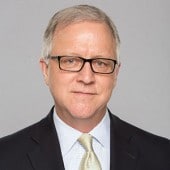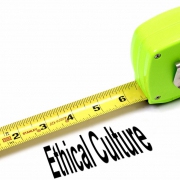Featured Culture and Business Ethics Expert: Marshall Schminke
Featured Culture and Business Ethics Expert: Marshall Schminke, BB&T Professor of Business Ethics at the University of Central Florida
 What are your main areas of research around business ethics?
What are your main areas of research around business ethics?
I focus on the idea that ethics don’t happen in isolation. They emerge from a complicated mix of individual and situational factors. My research explores this messy stew and how it drives ethical behavior. More specifically, I study the impact of organizational structure and culture on individual ethics, such as trying to understand climates that support or resist ethical decision making, abusive supervision, moral emotions, and ethical efficacy. My work also examines how ethical and unethical action drifts through organizations. I study how factors like trust and fairness—which provide the foundation for organizational ethics—“trickle down” the organization from managers to supervisors to line employees. Understanding these patterns helps to explain why relatively small changes in ethical or unethical activity may lead to profound, organization-wide effects.
How can organizational design impact culture and climate?
In recent years, flat, fast, flexible, organic organizational structures have come into favor because they are more adaptable, and therefore more effective in coping with rapidly changing environments. However, this benefit comes at a cost. The increased “behavioral free space” that these structures create does indeed enhance organizational adaptability. But they also contain fewer formal rules and procedures for governing individual behavior. That can be a problem, one that requires an offsetting informal structure for promoting ethics. Culture and climate are how that happens, and each must be managed in parallel with organizational design to get a proper fit between the two.
What do most companies overlook when it comes to organizational design?
Supervisors. Despite some high profile missteps, organizations generally do a pretty good job of making ethics a front-and-center issue at the upper levels. Likewise, they invest heavily in education and training at the level of the rank-and-file worker. But as with so many strategically important issues, low-to-mid-level supervisors are often ignored. This is troublesome, because research shows the single most important factor in driving employees’ ethical actions is not what top managers or coworkers say or do. Rather, it is the immediate supervisor—and whether he or she is capable of creating an ethically supportive work culture that employees experience every day—that matters most. Yet in most cases, these “sergeants and lieutenants” of the workplace receive relatively little attention when it comes to ethics and ethics training.
How can E&C teams better emphasize ethics vs. compliance?
Culture. It’s not that rules aren’t important. They are. And they must be understood and followed. But complex business environments—and complex ethical rules and standards—cannot address every situation employees might encounter. Therefore, the only real insurance organizations have for getting the best ethical effort possible from their employees is to bake it into the culture and climate, where it becomes second nature to employees trying to do their best in a tough business world.
What have you learned as a part of the ES culture measurement working group?
As a culture and climate researcher for years, this experience has been truly eye-opening for me. It has introduced me to different perspectives on culture and, in turn, exposed me to completely different ways of thinking about how to create and maintain effective ethical cultures. For example, of the eight components of ethical culture identified by the Ethical Systems culture measurement working group, I had only a passing familiarity with the ethical awareness and ethical leadership components. This experience has not only improved my understanding of those components, but has also heightened my awareness of how they fit and interact with the other six components.
What ethical concerns do family companies experience vs. larger corporations?
Although many companies describe themselves as families, even those with the tightest possible cultures cannot really replicate the challenges that emerge in family based businesses. This is not simply due to size; lots of small firms experience challenges similar to those faced by family run firms. It is how those challenges are met that creates the most dangerous minefields to be navigated by family firms. Suppose the department manager whose performance trails all others is your son. Suppose the senior manager who repeatedly ignores new market opportunities because she does not understand the technologies that underlie them is your mother. Suppose the new sales representative who has broken sales records in her first year but is found to be channeling refund dollars back to clients is your daughter? Other firms might talk like family or even feel like family. But the tough decisions they face do not involve seating charts at next year’s Thanksgiving dinner.
If you could give one piece of ethics advice to companies, what would it be?
Focus on your supervisors. They are the boots-on-the-ground people who create and maintain your company’s ethical culture. Without them, your efforts are dead in the water.
If you could give one piece of ethics advice to individuals, what would it be?
Business is really complicated, and really hard. But business ethics don’t have to be. As a starting point, you could do worse than listening to Aristotle. Practice ethics the way you would practice the piano or your golf swing. Make it a habit. Make it part of your disposition, your character. In short, do the right thing. Then do it again. And again. If you do that, you are far less likely to fall prey to fleeting (and potentially confusing) situational factors that can turn a clear ethical event cloudy. Yes, once in a while true ethical conundrums exist in business, right-versus-right decisions that could make even Aristotle squirm. But if we are being honest with ourselves, most business decisions involve right and wrong answers. So practice ethics every day, especially on the little things, so when the bigger issues arise it’s easier to do the right thing.
Additional Questions
- Featured Academic Article:
Arnaud, A., & Schminke, M. (2012). The ethical climate and context of organizations: A comprehensive model. Organization Science, 23, 1767–1780. doi:10.1287/orsc.1110.0698
This paper demonstrates that it’s not enough to simply have an ethical work climate that ensures high quality ethical decision making. Employees can know the right thing to do (ethical decision making climate), but that behavior won’t happen unless they care about doing so (collective moral emotions) and believe they have the ability and tools to carry that out (collective ethical efficacy). All three of these facets of ethical work climate must be baked in to an organization’s ethical culture in order for ethical behavior to emerge.
- Featured Popular Article:
I recommend a short little book called Defining Moments by Joseph Badaracco. Get a copy and read it on your next flight. It will change the way you think about ethics in your business life.







